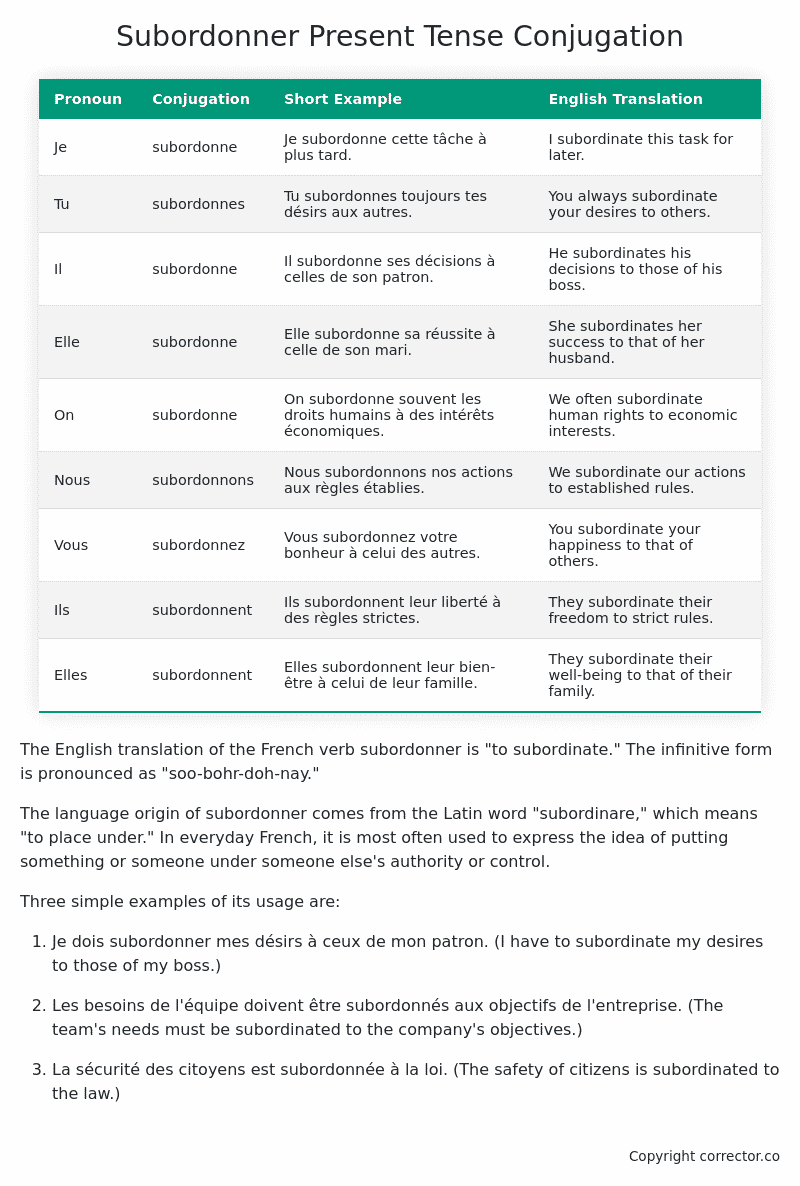Le Present (Present Tense) Conjugation of the French Verb subordonner
Introduction to the verb subordonner
The English translation of the French verb subordonner is “to subordinate.” The infinitive form is pronounced as “soo-bohr-doh-nay.”
The language origin of subordonner comes from the Latin word “subordinare,” which means “to place under.” In everyday French, it is most often used to express the idea of putting something or someone under someone else’s authority or control.
Three simple examples of its usage are:
-
Je dois subordonner mes désirs à ceux de mon patron. (I have to subordinate my desires to those of my boss.)
-
Les besoins de l’équipe doivent être subordonnés aux objectifs de l’entreprise. (The team’s needs must be subordinated to the company’s objectives.)
-
La sécurité des citoyens est subordonnée à la loi. (The safety of citizens is subordinated to the law.)
Subordonner – About the French Present Tense
To take a deep dive into all the French tenses then see our article on Mastering French Tense Conjugation.
Common Everyday Usage Patterns For Le Present
Interactions with Other Tenses
Table of the Present Tense Conjugation of subordonner
| Pronoun | Conjugation | Short Example | English Translation |
|---|---|---|---|
| Je | subordonne | Je subordonne cette tâche à plus tard. | I subordinate this task for later. |
| Tu | subordonnes | Tu subordonnes toujours tes désirs aux autres. | You always subordinate your desires to others. |
| Il | subordonne | Il subordonne ses décisions à celles de son patron. | He subordinates his decisions to those of his boss. |
| Elle | subordonne | Elle subordonne sa réussite à celle de son mari. | She subordinates her success to that of her husband. |
| On | subordonne | On subordonne souvent les droits humains à des intérêts économiques. | We often subordinate human rights to economic interests. |
| Nous | subordonnons | Nous subordonnons nos actions aux règles établies. | We subordinate our actions to established rules. |
| Vous | subordonnez | Vous subordonnez votre bonheur à celui des autres. | You subordinate your happiness to that of others. |
| Ils | subordonnent | Ils subordonnent leur liberté à des règles strictes. | They subordinate their freedom to strict rules. |
| Elles | subordonnent | Elles subordonnent leur bien-être à celui de leur famille. | They subordinate their well-being to that of their family. |
Other Conjugations for Subordonner.
Le Present (Present Tense) Conjugation of the French Verb subordonner (this article)
Imparfait (Imperfect) Tense Conjugation of the French Verb subordonner
Passé Simple (Simple Past) Tense Conjugation of the French Verb subordonner
Passé Composé (Present Perfect) Tense Conjugation of the French Verb subordonner
Futur Simple (Simple Future) Tense Conjugation of the French Verb subordonner
Futur Proche (Near Future) Tense Conjugation of the French Verb subordonner
Plus-que-parfait (Pluperfect) Tense Conjugation of the French Verb subordonner
Passé Antérieur (Past Anterior) Tense Conjugation of the French Verb subordonner
Futur Antérieur (Future Anterior) Tense Conjugation of the French Verb subordonner
Subjonctif Présent (Subjunctive Present) Tense Conjugation of the French Verb subordonner
Subjonctif Passé (Subjunctive Past) Tense Conjugation of the French Verb subordonner
Subjonctif Imparfait (Subjunctive Imperfect) Tense Conjugation of the French Verb subordonner
Conditionnel Présent (Conditional Present) Tense Conjugation of the French Verb subordonner
Conditionnel Passé (Conditional Past) Tense Conjugation of the French Verb subordonner
L’impératif Présent (Imperative Present) Tense Conjugation of the French Verb subordonner
L’infinitif Présent (Infinitive Present) Tense Conjugation of the French Verb subordonner
Struggling with French verbs or the language in general? Why not use our free French Grammar Checker – no registration required!
Get a FREE Download Study Sheet of this Conjugation 🔥
Simply right click the image below, click “save image” and get your free reference for the subordonner Present Tense tense conjugation!

I hope you enjoyed this article on the verb subordonner. Still in a learning mood? Check out another TOTALLY random French verb present conjugation!


